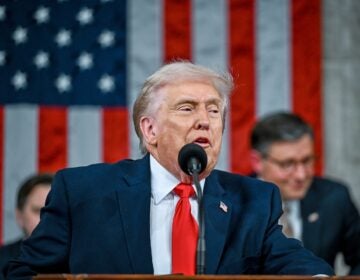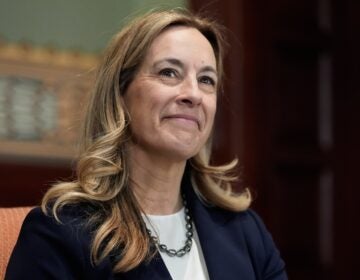Recalling decades of good work, many in district ready to forgive Fattah as sentencing nears
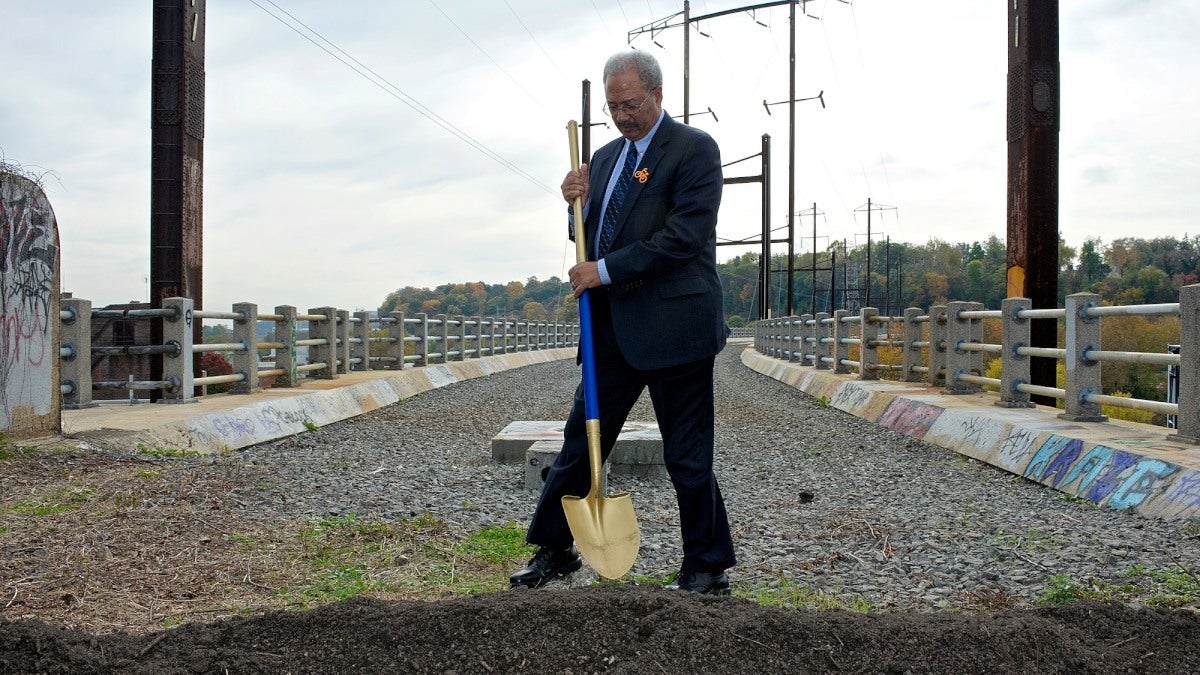
Chaka Fattah breaks ground on a bike path connecting Manayunk and Lower Merion Township on Oct. 28
Former U.S. Rep. Chaka Fattah will be sentenced in federal court Monday morning after his conviction on a slew of corruption charges in June. The 60-year-old Democrat is expected to receive jail time, completing a stunning fall from grace for one of Philadelphia’s most recognizable political names.
For some voters in his old district, Fattah’s crimes are more than a black eye on an otherwise honorable two-decade career in Congress. They’re enough to write him off completely.
But not everyone feels that way. A number of residents in West Philadelphia, the heart of the 2nd Congressional District, have a softer spot for Fattah and say his legacy is safe with them — no matter what. And most explanations have little connection to Fattah’s days in Washington.
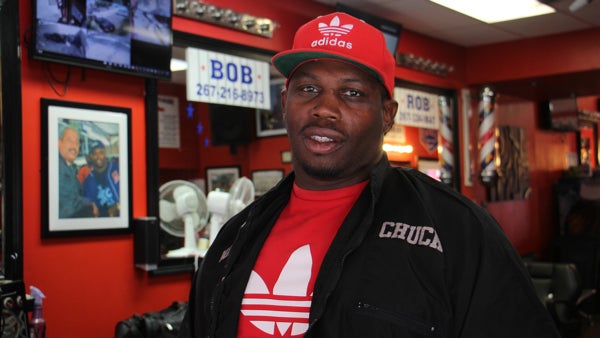 Charles Outlaw, owner of Major League Cuts, believes in second chances. (Emma Lee/WHYY)
Charles Outlaw, owner of Major League Cuts, believes in second chances. (Emma Lee/WHYY)
For Charles Outlaw, it’s about second chances. Like the one he received.
Outlaw owns Major League Cuts, a corner barbershop below the Market-Frankford El near 52nd Street.
Outlaw didn’t always cut hair. But, thanks to a government-funded program, he learned the skill while he was in prison on aggravated assault charges.
“My second chance actually allowed me to give a lot of people their second chance and give other people jobs. And I’m growing,” said Outlaw recently in between customers.
Outlaw says those kinds of stories resonate with people in his neighborhood. And so, while they may have found Fattah’s conviction surprising or shocking, they likely aren’t willing to forget about his accomplishments because of it.
Some of the proof illustrates the walls of the barbershop. In the waiting area, and by Outlaw’s station, hang photos of Fattah’s 2008 visit with then-presidential candidate Barack Obama. They’re not coming down.
 Framed photos of Fattah’s visit with President Barack Obama line the walls of the shop. (Emma Lee/WHYY)
Framed photos of Fattah’s visit with President Barack Obama line the walls of the shop. (Emma Lee/WHYY)
“That’s how the hood do. When you go through hardship, they try to — as long as you’re not really destroying people, killing people or really hurting somebody — they’ll really accept you back,” said Outlaw. “In his case, they’ll accept him back with open arms. I know they will. Everyone will.”
Before resigning from Congress in June, Fattah made more than $170,000 a year. But he didn’t grow up in that tax bracket. Gang activity was routine in his corner of South Philadelphia and, later, West Philadelphia.
That narrative, that someone from the neighborhood could rise to such heights, is powerful for many neighbors, said Gregory Williams, a longtime family friend.
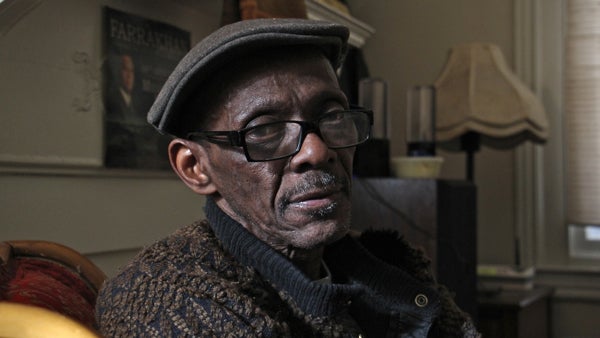 Gregory Williams, a longtime Fattah family friend, knew Chaka as a boy. (Emma Lee/WHYY)
Gregory Williams, a longtime Fattah family friend, knew Chaka as a boy. (Emma Lee/WHYY)
“That’s like their knight in shinning armor. They can say, ‘Wow, I knew that kid. I knew that boy. I knew that man.’ Not just hearing his name, but knowing him personally,” said Williams inside his home on Spring Street.
Early start in politics
Fattah moved to the 1400 block of Frazier Street in the late 1960s. It’s where his parents launched the House of Umoja, where Fattah’s political roots began to take hold.
The now-closed residential program for juvenile offenders started inside the Fattah home, but eventually expanded to nearly two dozen properties along the narrow block not far from Girard Avenue.
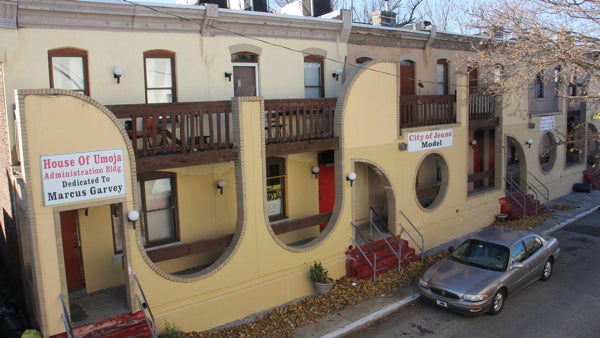 The House of Umoja on Frazier Street, founded by Fattah’s parents, provided a residential rehabilitation program for juvenile offenders. (Emma Lee/WHYY)
The House of Umoja on Frazier Street, founded by Fattah’s parents, provided a residential rehabilitation program for juvenile offenders. (Emma Lee/WHYY)
While in high school, Fattah worked with the teens living in what was known to everyone in the neighborhood as “Boys Town,” mostly focusing on education.
“Every time you used to see him, he had a book in his hand. They used to call him ‘The Bookworm.’ They used to mess with him a little bit … because he was a bit of a nerd,” said Williams.
While studying at Overbrook High School, Fattah also helped start the Youth Movement to Clean Up Politics, a piece of the black political movement that took aim at the Democratic machine, even if it often fell short.
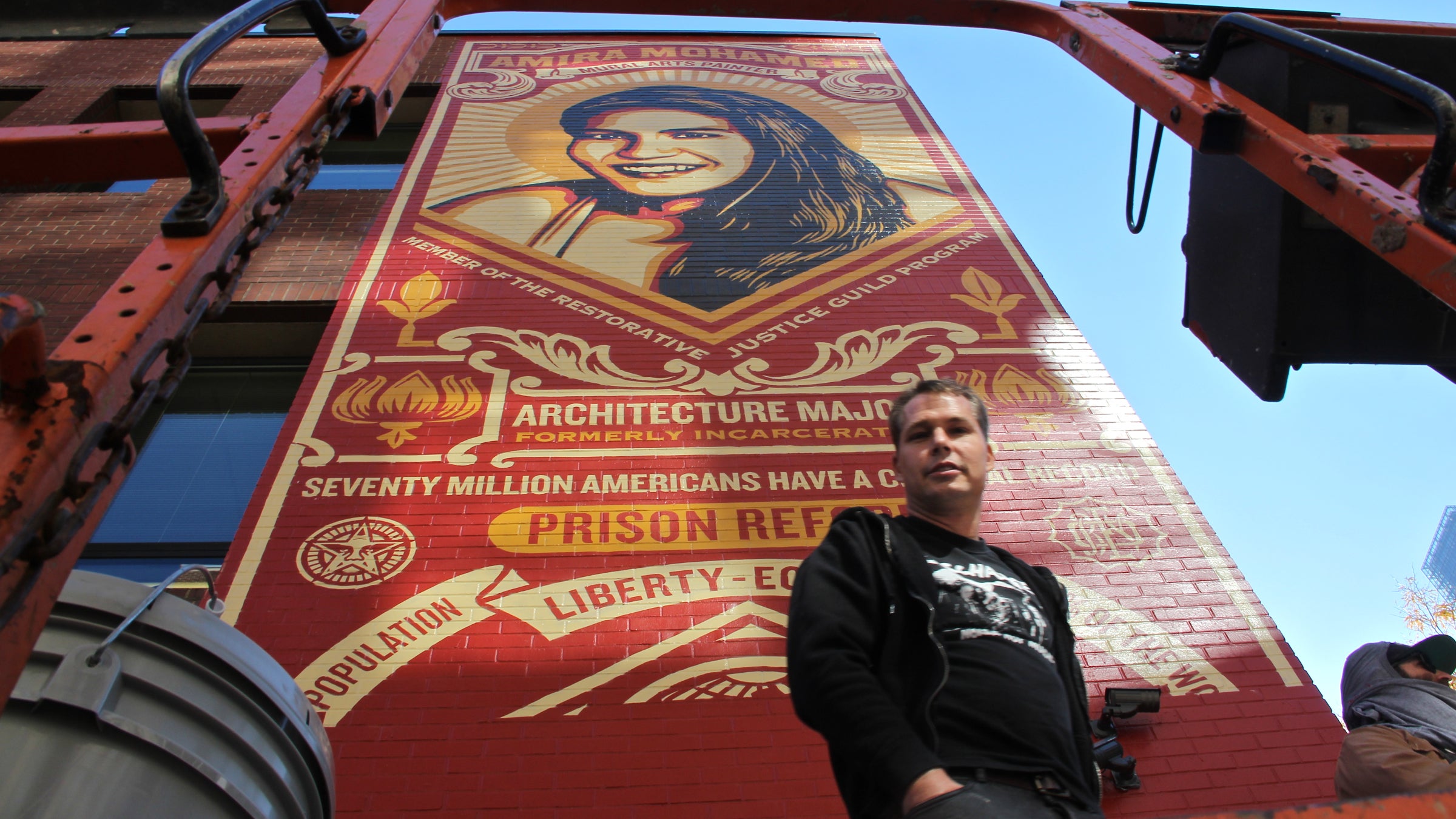 A mural on Master Street honors Fattah’s mother, Falaka Fattah, and her House of Umoja. (Emma Lee/WHYY)
A mural on Master Street honors Fattah’s mother, Falaka Fattah, and her House of Umoja. (Emma Lee/WHYY)
Fattah took to the streets, canvassing the neighborhood to hear residents’ concerns in an effort to make their lives better. Longtime resident Cheryl Talib still remembers those days fondly.
“[Fattah] was always pleasant. He always gave you the feeling that you could come to him,” said Talib.
She didn’t closely follow Fattah’s time in Congress, but, for her, those early days are enough to cement his legacy.
“There’s still a lot of good stuff on Chaka’s plate,” said Talib. “He did a lot of good things. So, yes, he’s fallen, but I don’t think that’s all him.”
Bringing dollars back to district
Over the years, Fattah has often touted the millions he helped steer to the 2nd Congressional District, which also includes parts of Northwest and North Philadelphia, as well as most of Lower Merion Township in Montgomery County. It was a big part of his failed bid for a 12th term this spring.
The money has helped fund transportation projects, neuroscience research and college-readiness programs.
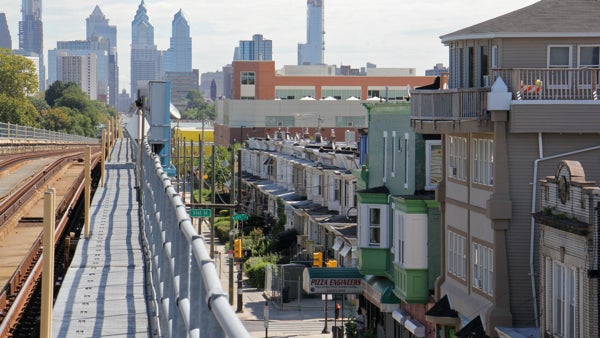 The money Fattah steered to his district funded transportation projects, neuroscience research, and college-readiness programs. (Emma Lee/WHYY)
The money Fattah steered to his district funded transportation projects, neuroscience research, and college-readiness programs. (Emma Lee/WHYY)
Philadelphia City Councilman Curtis Jones Jr. grew up with Fattah and, to this day, considers him a close friend. He said Fattah was never good at connecting with voters about his record, but that there’s no question Fattah should be remembered for it, not his conviction.
He certainly will.
“He’s going to be my friend who actually flew on Air Force One. He’s a friend that actually changed public housing in the city of Philadelphia. He’s a friend that helped a lot of kids go to higher education. He’s a friend that, when I needed him, let me move into his house,” said Jones, who has not spoken publicly about Fattah since his indictment.
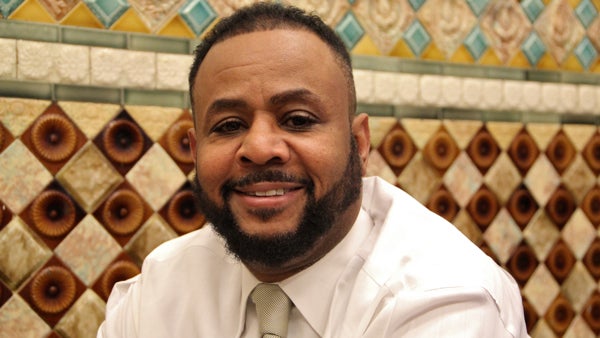 Philadelphia City Councilman Curtis Jones grew up with Fattah. (Emma Lee/WHYY)
Philadelphia City Councilman Curtis Jones grew up with Fattah. (Emma Lee/WHYY)
Jones added that Fattah also encouraged others to get involved in politics and help their communities, such as Pennsylvania state Sen. Vincent Hughes and Philadelphia City Councilwoman Blondell Reynolds-Brown.
“All of them came under or behind him because he had the audacity to go up against the party. It was almost against the machine. That makes him popular,” said Jones.
Some can’t get past disappointment
Longtime resident Louis Alston is among those who just can’t forgive Fattah for being indicted and convicted for political corruption. It’s all too selfish, too puzzling to overlook.
“He didn’t have to go that route,” said Alston. “He was already ahead. He had what he wanted. His dream was fulfilled — beautiful wife, family. And then things like that — that hurt people? Come on. I don’t think that was fair.”
Those closest to Fattah have been loath to publicly discuss how they feel about their friend’s crimes.
In June, a federal jury found Fattah stole hundreds of thousands of taxpayer dollars and charitable donations to help repay part of an illegal $1 million loan made to his failed bid for Philadelphia mayor in 2007.
The panel also said that Fattah accepted bribes from a friend who wanted to become a U.S. ambassador with the Obama administration and used campaign cash to help his son pay off some of his college loan.
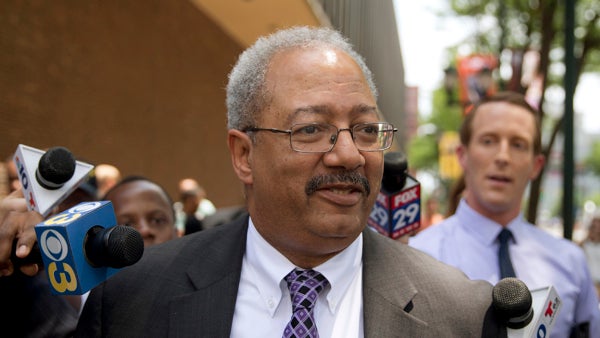 Fattah leaves the federal courthouse in Philadelphia on Tuesday, June 21, 2016, after being convicted in a racketeering case. (AP Photo/Matt Rourke)
Fattah leaves the federal courthouse in Philadelphia on Tuesday, June 21, 2016, after being convicted in a racketeering case. (AP Photo/Matt Rourke)
Federal prosecutors have asked U.S. District Judge Harvey Bartle III to hand Fattah 17-22 years for orchestrating what they called at trial a “white-collar crime spree.”
Fattah’s lawyers say that’s “unnecessarily harsh” and are asking Bartle to give their client a shorter sentence based on the good Fattah did during his career and the penalties given to other politicians convicted of corruption. They cited former state Sen. Vince Fumo and former Philadelphia City Councilman Rick Mariano among others whose jail terms were shorter than what prosecutors are requesting for Fattah.
At trial, they argued that Fattah had nothing to do with any of the schemes detailed in the government’s indictment. Instead, they said, it was a pair of political operatives who were pulling the strings.
“[Assistant U.S. Attorney Jonathan] Kravis called it a white-collar crime spree. I call it a smear. They throw a lot at the wall to make this look dastardly,” said defense attorney Samuel Silver during his closing statement.
Fattah has maintained his innocence, calling the charges against him “frivolous.” He declined comment through his attorneys, saying he didn’t want to be interviewed for a story that would be published before the judge pronounced his sentence.
An appeal is expected.
WHYY is your source for fact-based, in-depth journalism and information. As a nonprofit organization, we rely on financial support from readers like you. Please give today.



